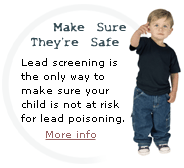 |
In 1996, the Vermont State Legislature passed the Essential Maintenance Practices Law, to help prevent childhood lead poisoning in rental housing and child care facilities. The law was most recently updated in 2008 with changes for all owners of pre-1978 housing. Under the new law, all paint in pre-1978 housing is presumed to be lead-based, unless a certified inspector has determined that it is lead free. The new law prohibits unsafe work practices when disturbing lead paint in all pre 1978 housing and requires certain safe practices to be followed. Pre-1978 housing now includes hotels, motels, or other lodging rented for more than 30 days.
|
Owners of rental property and child care facilities must:
- Complete a Vermont Department of Health (VDH) approved training course, or have a representative of the owner’s maintenance staff complete the course;
- Provide written information on lead paint hazards to current and prospective tenants;
- Perform Essential Maintenance Practices (EMPs)
- Post a notice in the building asking occupants to report deteriorated paint to the owner or agent;
- Sign a compliance statement indicating that EMPs have been completed and provide a copy annually to their insurance carrier, the VDH, and the tenants. Child care facilities must also submit a copy of the compliance statement to the Department for Children and Families.
Vermont’s Essential Maintenance Practices are:
- Perform a visual on-site inspection of interior and exterior surfaces to identify deteriorated paint;
- Install window well inserts in all window wells;
- Stabilize paint if more than one square foot of deteriorated paint is found on any interior or exterior surface within 30 days of identification or report by the tenant;
- Take reasonable precautions when disturbing paint, which includes not utilizing prohibited unsafe practices;
- Use lead safe work practices to prevent the spread of dust;
- Remove visible paint chips from the ground on the property
- Perform specialized cleaning at the conclusion of work or when the unit turns over and at least annually in common areas.
Lead safe work practices must be used if disturbing more than 1 square foot of paint in pre-1978 rental housing or daycare facilities and are now required in pre-1978 owner-occupied housing as well.
Prohibited Unsafe Work Practices: |
Required Safe Work practices: |
- Open flame burning or torching of paint
|
- Limiting access to interior and exterior work areas
|
- Use of heat guns operated above 1,100 degrees Fahrenheit
|
- Enclosing work areas with plastic sheeting or dust barriers
|
|
- Using protective clothing
|
- Machine sanding or grinding
|
- Misting painted surfaces before disturbing paint
|
- Uncontained hydro-blasting or high pressure power washing
|
- Wetting paint debris before sweeping to minimize dust
|
- Abrasive or sand blasting without containment or high efficiency particulate exhaust controls
|
|
|
For more information on both State of Vermont and Federal
Lead Laws, go to the Vermont
Tenants Site.
|


